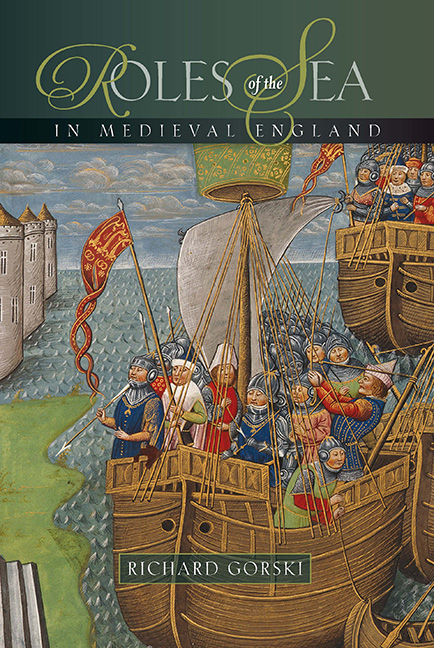Book contents
- Frontmatter
- Contents
- List of Contributors
- Map
- 1 Roles of the Sea: Views from the Shore
- 2 Changes in Ship Design and Construction: England in the European Mould
- 3 The Value of the Cinque Ports to the Crown 1200–1500
- 4 The Contribution of the Cinque Ports to the Wars of Edward II and Edward III: New Methodologies and Estimates
- 5 Keeping the Seas: England's Admirals, 1369–1389
- 6 The Cost-Benefit Analysis of a Fourteenth-Century Naval Campaign: Margate/Cadzand, 1387
- 7 Piracy and Anglo-Hanseatic Relations, 1385–1420
- 8 ‘Herring of Sligo and Salmon of Bann‘: Bristol's Maritime Trade with Ireland in the Fifteenth Century
- 9 How Much did the Sea Matter in Medieval England 167 (c.1200–c.1500)?
- Index
5 - Keeping the Seas: England's Admirals, 1369–1389
Published online by Cambridge University Press: 05 September 2016
- Frontmatter
- Contents
- List of Contributors
- Map
- 1 Roles of the Sea: Views from the Shore
- 2 Changes in Ship Design and Construction: England in the European Mould
- 3 The Value of the Cinque Ports to the Crown 1200–1500
- 4 The Contribution of the Cinque Ports to the Wars of Edward II and Edward III: New Methodologies and Estimates
- 5 Keeping the Seas: England's Admirals, 1369–1389
- 6 The Cost-Benefit Analysis of a Fourteenth-Century Naval Campaign: Margate/Cadzand, 1387
- 7 Piracy and Anglo-Hanseatic Relations, 1385–1420
- 8 ‘Herring of Sligo and Salmon of Bann‘: Bristol's Maritime Trade with Ireland in the Fifteenth Century
- 9 How Much did the Sea Matter in Medieval England 167 (c.1200–c.1500)?
- Index
Summary
During the Hundred Years War, English military efforts on land and at sea were closely linked. Often, the naval arm of the Plantagenet warmachine played a crucial but ultimately supporting role in transporting large numbers of combatants across the Channel and, indeed, still further, to Aquitaine or Iberia. In the summer of 1346, for example, some 747 vessels were employed to transport ‘about 14,000 fighting men’ in the army of Edward III to Normandy for the Crécy–Calais campaign, while the shipping of some 3,000 men and their mounts to Galicia four decades later under John of Gaunt must also have required a huge logistical effort over a considerably longer distance. Indeed, recent work on the transport fleets of the reign of Edward III has surmised that ‘by 1360 England's maritime communities had supplied thousands of ships and tens of thousands of men for service in the campaigns’. Moreover, the fourteenth century was also a time of increased naval combat and raiding, with the battles of Sluys (1340), ‘Les Espagnols sur Mer’ (1350) and La Rochelle (1372) testifying to a conflict that was being played out on the open seas as well as on dry land. It is somewhat surprising, then, that so little is still known about the government officials who, in theory at least, held primary responsibility for the English naval effort: its admirals. The aim of this essay is to focus on the men who occupied this office, their powers, duties and activities, with a view to assessing whether they were, in fact, as significant as their high rank suggests.
It lies beyond the scope of the present study to consider the role played by the kings’ admirals during the entirety of the Hundred Years War. Instead, the emphasis will be on the admirals appointed during a twenty-year period between the reopening of the war in 1369 and the signing of the Truce of Leulinghem in 1389, a period that deliberately replicates that covered by J.W. Sherborne in his influential article on English shipping and naval manpower. In deciding to focus on this particular stretch of campaigning, Sherborne commented how ‘in the twenty years between 1369 and 1389 England and France … were continuously at war except for the truces of 27 June 1375 to 1 April 1377 and 24 January 1384 to 1 May 1385’.
- Type
- Chapter
- Information
- Roles of the Sea in Medieval England , pp. 79 - 102Publisher: Boydell & BrewerPrint publication year: 2012



